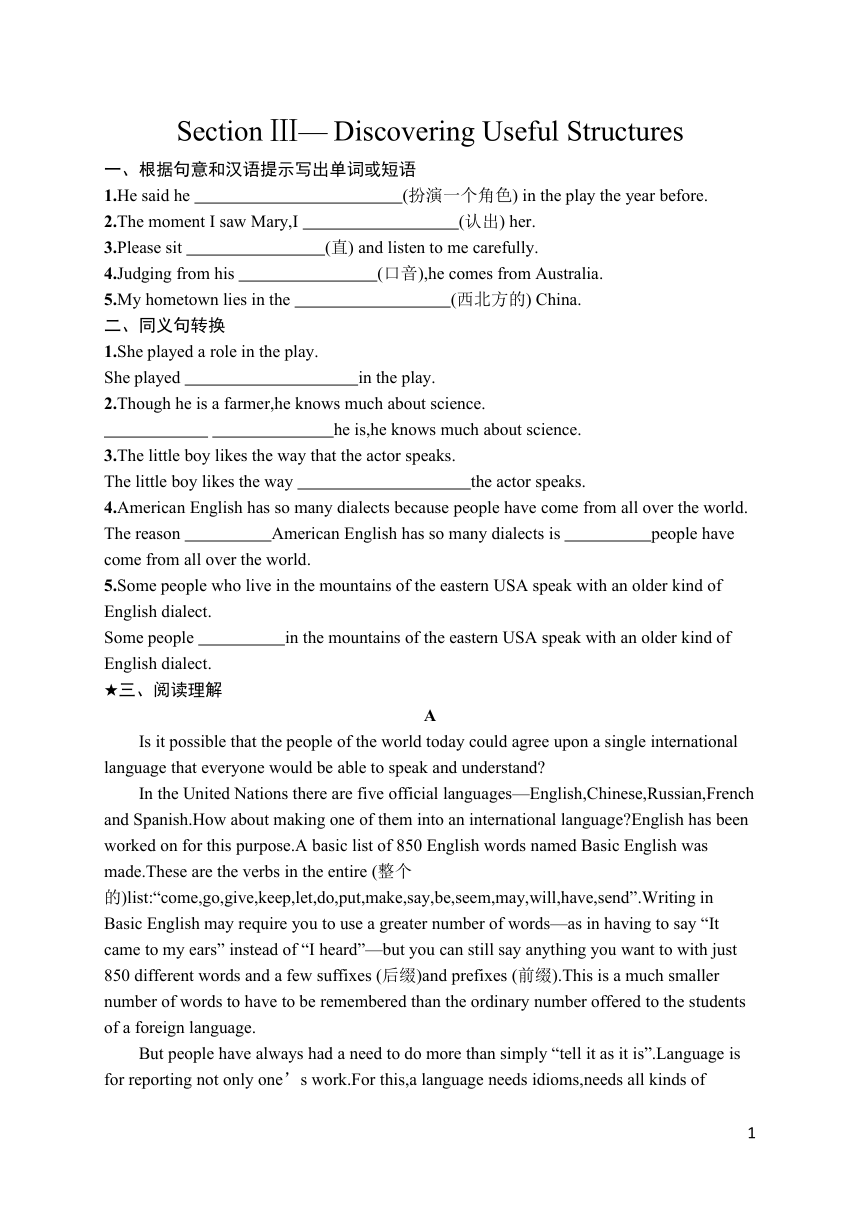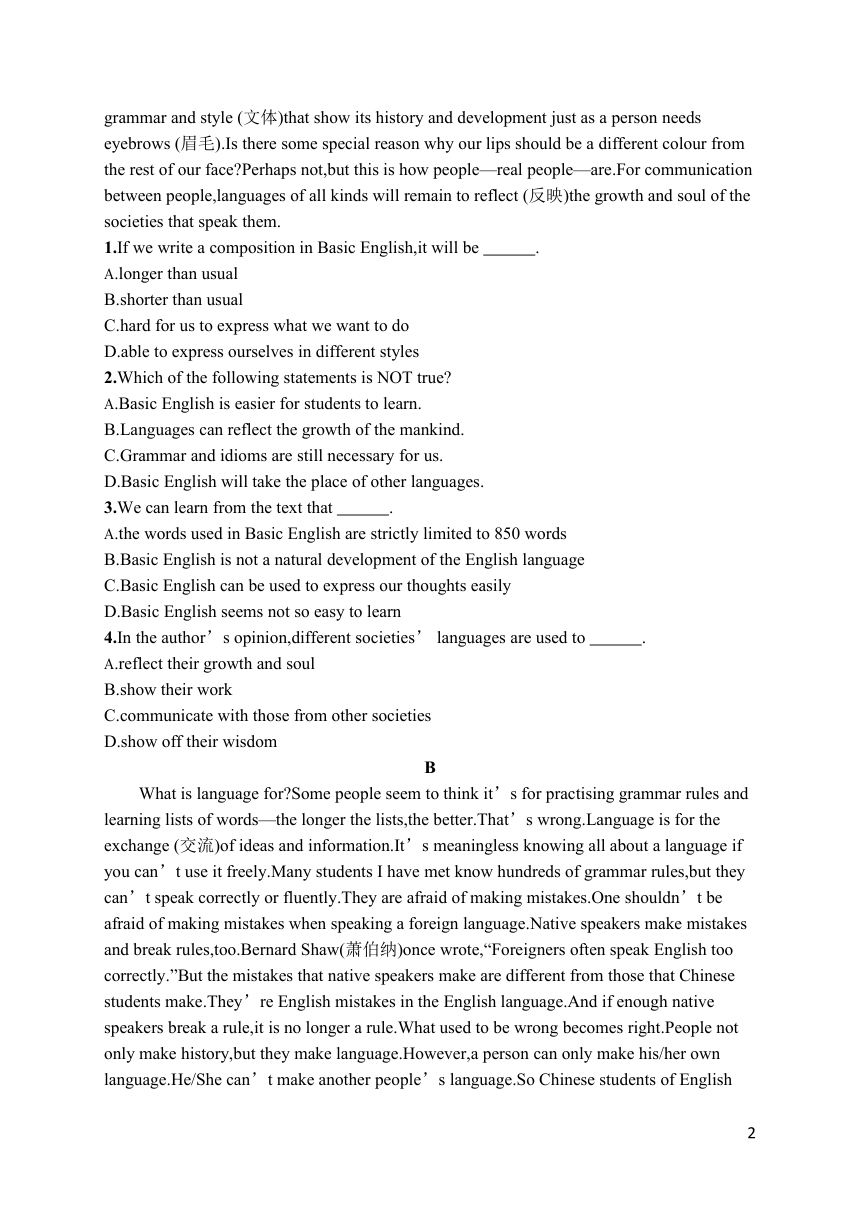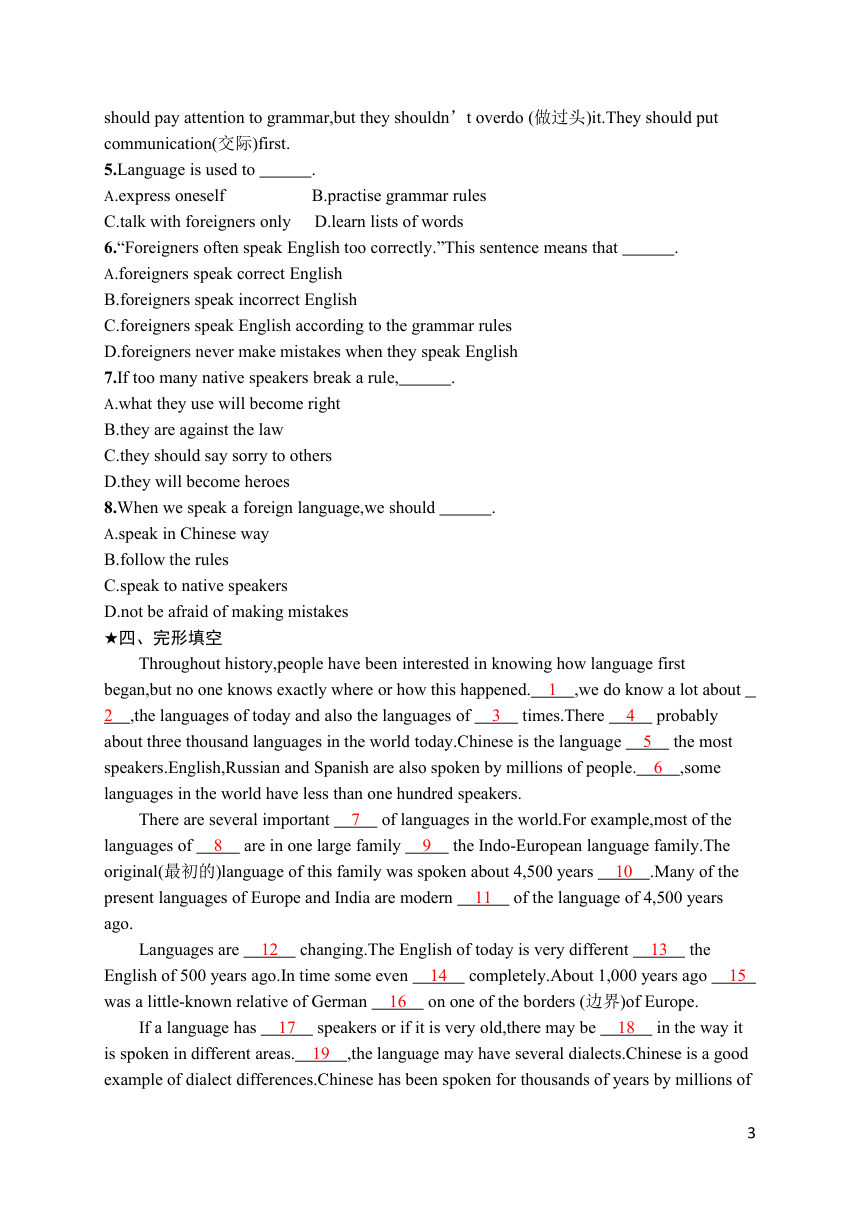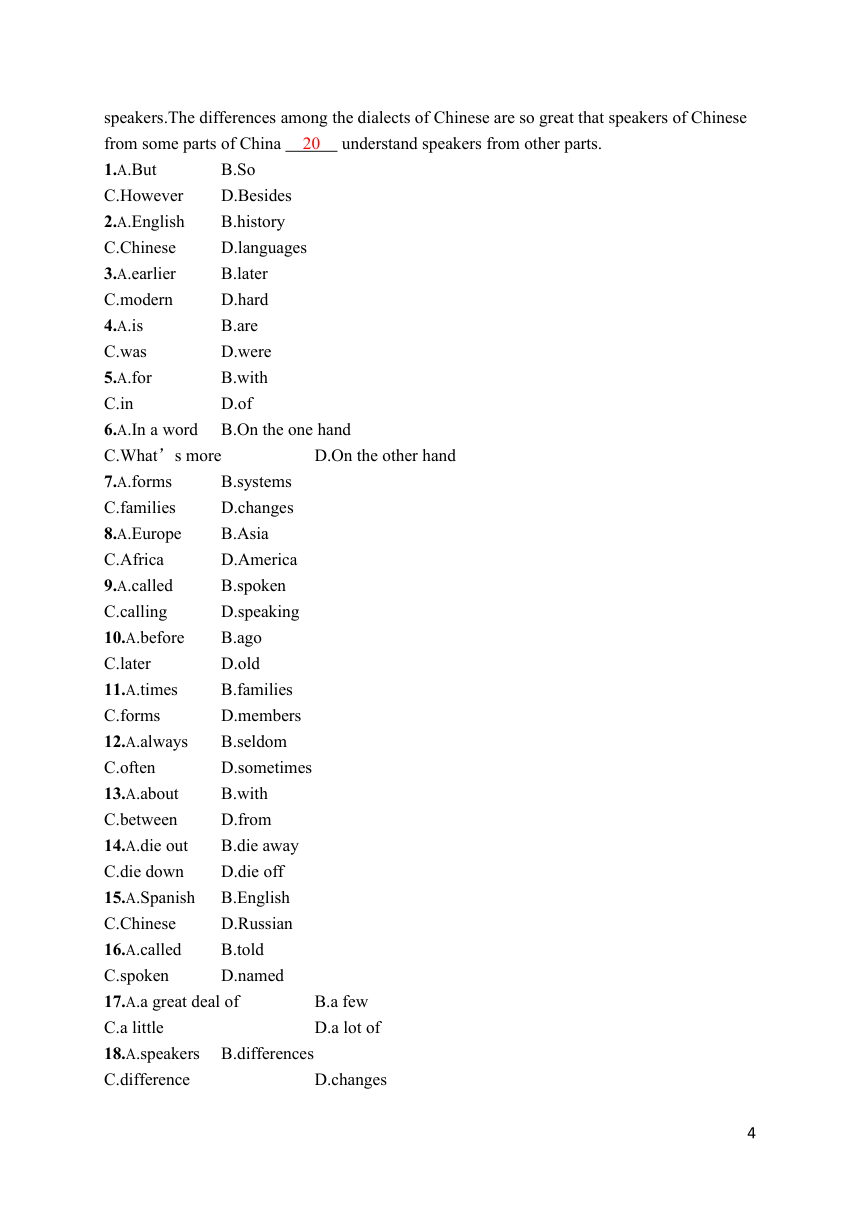人教版(2019)必修 第一册Unit 2 Travelling around Discovering Useful Structures 同步练习(含答案)
文档属性
| 名称 | 人教版(2019)必修 第一册Unit 2 Travelling around Discovering Useful Structures 同步练习(含答案) |  | |
| 格式 | docx | ||
| 文件大小 | 37.8KB | ||
| 资源类型 | 教案 | ||
| 版本资源 | 人教版(2019) | ||
| 科目 | 英语 | ||
| 更新时间 | 2024-04-21 22:46:07 | ||
图片预览




文档简介
Section Ⅲ— Discovering Useful Structures
一、根据句意和汉语提示写出单词或短语
1.He said he (扮演一个角色) in the play the year before.
2.The moment I saw Mary,I (认出) her.
3.Please sit (直) and listen to me carefully.
4.Judging from his (口音),he comes from Australia.
5.My hometown lies in the (西北方的) China.
二、同义句转换
1.She played a role in the play.
She played in the play.
2.Though he is a farmer,he knows much about science.
he is,he knows much about science.
3.The little boy likes the way that the actor speaks.
The little boy likes the way the actor speaks.
4.American English has so many dialects because people have come from all over the world.
The reason American English has so many dialects is people have come from all over the world.
5.Some people who live in the mountains of the eastern USA speak with an older kind of English dialect.
Some people in the mountains of the eastern USA speak with an older kind of English dialect.
★三、阅读理解
A
Is it possible that the people of the world today could agree upon a single international language that everyone would be able to speak and understand
In the United Nations there are five official languages—English,Chinese,Russian,French and Spanish.How about making one of them into an international language English has been worked on for this purpose.A basic list of 850 English words named Basic English was made.These are the verbs in the entire (整个的)list:“come,go,give,keep,let,do,put,make,say,be,seem,may,will,have,send”.Writing in Basic English may require you to use a greater number of words—as in having to say “It came to my ears” instead of “I heard”—but you can still say anything you want to with just 850 different words and a few suffixes (后缀)and prefixes (前缀).This is a much smaller number of words to have to be remembered than the ordinary number offered to the students of a foreign language.
But people have always had a need to do more than simply “tell it as it is”.Language is for reporting not only one’s work.For this,a language needs idioms,needs all kinds of grammar and style (文体)that show its history and development just as a person needs eyebrows (眉毛).Is there some special reason why our lips should be a different colour from the rest of our face Perhaps not,but this is how people—real people—are.For communication between people,languages of all kinds will remain to reflect (反映)the growth and soul of the societies that speak them.
1.If we write a composition in Basic English,it will be .
A.longer than usual
B.shorter than usual
C.hard for us to express what we want to do
D.able to express ourselves in different styles
2.Which of the following statements is NOT true
A.Basic English is easier for students to learn.
B.Languages can reflect the growth of the mankind.
C.Grammar and idioms are still necessary for us.
D.Basic English will take the place of other languages.
3.We can learn from the text that .
A.the words used in Basic English are strictly limited to 850 words
B.Basic English is not a natural development of the English language
C.Basic English can be used to express our thoughts easily
D.Basic English seems not so easy to learn
4.In the author’s opinion,different societies’ languages are used to .
A.reflect their growth and soul
B.show their work
C.communicate with those from other societies
D.show off their wisdom
B
What is language for Some people seem to think it’s for practising grammar rules and learning lists of words—the longer the lists,the better.That’s wrong.Language is for the exchange (交流)of ideas and information.It’s meaningless knowing all about a language if you can’t use it freely.Many students I have met know hundreds of grammar rules,but they can’t speak correctly or fluently.They are afraid of making mistakes.One shouldn’t be afraid of making mistakes when speaking a foreign language.Native speakers make mistakes and break rules,too.Bernard Shaw(萧伯纳)once wrote,“Foreigners often speak English too correctly.”But the mistakes that native speakers make are different from those that Chinese students make.They’re English mistakes in the English language.And if enough native speakers break a rule,it is no longer a rule.What used to be wrong becomes right.People not only make history,but they make language.However,a person can only make his/her own language.He/She can’t make another people’s language.So Chinese students of English should pay attention to grammar,but they shouldn’t overdo (做过头)it.They should put communication(交际)first.
5.Language is used to .
A.express oneself B.practise grammar rules
C.talk with foreigners only D.learn lists of words
6.“Foreigners often speak English too correctly.”This sentence means that .
A.foreigners speak correct English
B.foreigners speak incorrect English
C.foreigners speak English according to the grammar rules
D.foreigners never make mistakes when they speak English
7.If too many native speakers break a rule, .
A.what they use will become right
B.they are against the law
C.they should say sorry to others
D.they will become heroes
8.When we speak a foreign language,we should .
A.speak in Chinese way
B.follow the rules
C.speak to native speakers
D.not be afraid of making mistakes
★四、完形填空
Throughout history,people have been interested in knowing how language first began,but no one knows exactly where or how this happened. 1 ,we do know a lot about 2 ,the languages of today and also the languages of 3 times.There 4 probably about three thousand languages in the world today.Chinese is the language 5 the most speakers.English,Russian and Spanish are also spoken by millions of people. 6 ,some languages in the world have less than one hundred speakers.
There are several important 7 of languages in the world.For example,most of the languages of 8 are in one large family 9 the Indo-European language family.The original(最初的)language of this family was spoken about 4,500 years 10 .Many of the present languages of Europe and India are modern 11 of the language of 4,500 years ago.
Languages are 12 changing.The English of today is very different 13 the English of 500 years ago.In time some even 14 completely.About 1,000 years ago 15 was a little-known relative of German 16 on one of the borders (边界)of Europe.
If a language has 17 speakers or if it is very old,there may be 18 in the way it is spoken in different areas. 19 ,the language may have several dialects.Chinese is a good example of dialect differences.Chinese has been spoken for thousands of years by millions of speakers.The differences among the dialects of Chinese are so great that speakers of Chinese from some parts of China 20 understand speakers from other parts.
1.A.But B.So
C.However D.Besides
2.A.English B.history
C.Chinese D.languages
3.A.earlier B.later
C.modern D.hard
4.A.is B.are
C.was D.were
5.A.for B.with
C.in D.of
6.A.In a word B.On the one hand
C.What’s more D.On the other hand
7.A.forms B.systems
C.families D.changes
8.A.Europe B.Asia
C.Africa D.America
9.A.called B.spoken
C.calling D.speaking
10.A.before B.ago
C.later D.old
11.A.times B.families
C.forms D.members
12.A.always B.seldom
C.often D.sometimes
13.A.about B.with
C.between D.from
14.A.die out B.die away
C.die down D.die off
15.A.Spanish B.English
C.Chinese D.Russian
16.A.called B.told
C.spoken D.named
17.A.a great deal of B.a few
C.a little D.a lot of
18.A.speakers B.differences
C.difference D.changes
19.A.That is B.Therefore
C.In fact D.However
20.A.mustn’t B.may not
C.won’t D.can’t
★五、语篇填空
There are thousands of languages in the world.English is one of the world’s most 1. (wide)used languages.It is 2. (speak) by nearly three hundred million people:in the United States,Britain,Canada,some Caribbean countries and South Africa.As a 3. (two) language,English is often necessary for business,education,information and other activities in a good many countries such 4. India,Pakistan and so on.It is also one of the 5. (work)languages in the United Nations and is used 6. (much)than the others.
English has become the language of international trade and transport.7. has been said that 60 percent of the world’s radio broadcasts and 70 percent of the world’s mails are 8. English.At international sports meets,at meetings of scientists 9. different countries and at talks of 10. (write) from the corners of the earth,English is mostly used.
So English has also become the language of international cooperation in science and technology.
1.答案:had played a part
2.答案:recognized
3.答案:straight
4.答案:accent
5.答案:northwestern
1.答案:a part
2.答案:Farmer as/though
3.答案:in which
4.答案:why;that
5.答案:living
1.答案:A
解析:推理判断题。由第二段第六句可知,想表达“I heard”需要用“It came to my ears”来代替,这表明用Basic English写出来的作文应该比通常的情况要长。
2.答案:D
解析:细节理解题。由第二段最后一句可知A项的叙述是正确的;由第三段可知B项和C项的叙述正确。只有D项的内容没有被提到。
3.答案:B
解析:推理判断题。由第二段第四句可知Basic English并非英语语言自然发展的产物。
4.答案:A
解析:细节理解题。由短文最后一句可以得出,不同社会的语言可以反映它们的发展和精神。
5.答案:A
解析:细节理解题。由第一段中的“Language is for the exchange of ideas and information.”可知这句话和“express oneself ”表达的意思相同,即“表达自己想说的话”。
6.答案:C
解析:细节理解题。根据上下文,非英语国家的人在学英语时,首先要学许多的语法规则,由此推出他们说话时总是套规则,太死板。
7.答案:A
解析:细节理解题。由文中的“And if enough native speakers break a rule,it is no longer a rule.What used to be wrong becomes right.”可知如果足够多的母语使用者都打破某项语法规则,那就不再是规则,错误的东西就成为正确的东西。这与A项的叙述一致。
8.答案:D
解析:推理判断题。通过文章我们知道语言的作用是什么,而且更明确在学习外语时不仅要学语法,更重要的是学会使用这种语言来交流,不能怕犯错误。
1.答案:C
解析:语言的起源一直是人们感兴趣的事情,但是没有人确切地知道语言的起源究竟是怎样的。然而,我们还是对语言有许多了解。but后不能出现逗号。
2.答案:D
解析:由上下文可知此处一直在讲对语言的认识,而不单纯是对汉语或英语的认识。
3.答案:A
解析:人们对现在的语言以及更早的语言有所了解。由上下文可知此处与today对应。
4.答案:B
解析:由后面的“about three thousand languages in the world today”可知此处应用be动词的一般现在时的复数形式。
5.答案:B
解析:由with构成的介词短语做定语,修饰language,表示“汉语是使用人数最多的一种语言”。
6.答案:D
解析:上文指出汉语是使用人数最多的一种语言,接着又说英语、俄语和西班牙语也有数百万人使用,后文话锋一转,讲到还有不到一百人使用的语言,所以此处用on the other hand。
7.答案:C
解析:由后面的内容可知语言有几大语系,用families表示。下文的one large family也是提示。
8.答案:A
解析:由后面的“Indo-European language family”可知,欧洲的大多数语言都属于一个大的语系——印欧语系。
9.答案:A
解析:过去分词called做定语,表示“被称作”。
10.答案:B
解析:由前面的“was spoken”可知,此处应该用与一般过去时连用的ago。before用于过去完成时的句子中。
11.答案:C
解析:现在印度与欧洲的一些语言实际上就是4,500年以前的语言的现代形式(forms)。
12.答案:A
解析:由下文可知,语言一直都在发展变化。always与现在进行时连用表示“总是”。
13.答案:D
解析:be different from“与……不同”,为固定短语。
14.答案:A
解析:经过一段时间有些语言完全消失了。die out“灭绝,死光,消失”;die away“逐渐模糊,逐渐减弱”;die down“逐渐变弱,暗淡”;die off“相继死去”。
15.答案:B
解析:一千年前的英语还与当时人们讲的德语有亲缘关系。
16.答案:C
解析:表示“讲(某种语言)”用speak,此处用过去分词做定语表示被动。
17.答案:D
解析:讲某种语言的人多或某种语言很古老,那么不同地区人们说话的方式就有差别。A、C项只修饰不可数名词;a few表示“几个”,意义不符。
18.答案:B
解析:由上文可知此处指人们说话方式的不同,用复数形式。
19.答案:A
解析:此处是对上文的说明:也就是说(that is),一种语言可能有几种方言。
20.答案:D
解析:方言的差别如此之大,以至于来自不同地区的人都无法相互沟通。此处表示“不会,不能”,故用can’t。
答案:1.widely 2.spoken 3.second 4.as 5.working 6.more 7.It 8.in 9.from 10.writers
5
一、根据句意和汉语提示写出单词或短语
1.He said he (扮演一个角色) in the play the year before.
2.The moment I saw Mary,I (认出) her.
3.Please sit (直) and listen to me carefully.
4.Judging from his (口音),he comes from Australia.
5.My hometown lies in the (西北方的) China.
二、同义句转换
1.She played a role in the play.
She played in the play.
2.Though he is a farmer,he knows much about science.
he is,he knows much about science.
3.The little boy likes the way that the actor speaks.
The little boy likes the way the actor speaks.
4.American English has so many dialects because people have come from all over the world.
The reason American English has so many dialects is people have come from all over the world.
5.Some people who live in the mountains of the eastern USA speak with an older kind of English dialect.
Some people in the mountains of the eastern USA speak with an older kind of English dialect.
★三、阅读理解
A
Is it possible that the people of the world today could agree upon a single international language that everyone would be able to speak and understand
In the United Nations there are five official languages—English,Chinese,Russian,French and Spanish.How about making one of them into an international language English has been worked on for this purpose.A basic list of 850 English words named Basic English was made.These are the verbs in the entire (整个的)list:“come,go,give,keep,let,do,put,make,say,be,seem,may,will,have,send”.Writing in Basic English may require you to use a greater number of words—as in having to say “It came to my ears” instead of “I heard”—but you can still say anything you want to with just 850 different words and a few suffixes (后缀)and prefixes (前缀).This is a much smaller number of words to have to be remembered than the ordinary number offered to the students of a foreign language.
But people have always had a need to do more than simply “tell it as it is”.Language is for reporting not only one’s work.For this,a language needs idioms,needs all kinds of grammar and style (文体)that show its history and development just as a person needs eyebrows (眉毛).Is there some special reason why our lips should be a different colour from the rest of our face Perhaps not,but this is how people—real people—are.For communication between people,languages of all kinds will remain to reflect (反映)the growth and soul of the societies that speak them.
1.If we write a composition in Basic English,it will be .
A.longer than usual
B.shorter than usual
C.hard for us to express what we want to do
D.able to express ourselves in different styles
2.Which of the following statements is NOT true
A.Basic English is easier for students to learn.
B.Languages can reflect the growth of the mankind.
C.Grammar and idioms are still necessary for us.
D.Basic English will take the place of other languages.
3.We can learn from the text that .
A.the words used in Basic English are strictly limited to 850 words
B.Basic English is not a natural development of the English language
C.Basic English can be used to express our thoughts easily
D.Basic English seems not so easy to learn
4.In the author’s opinion,different societies’ languages are used to .
A.reflect their growth and soul
B.show their work
C.communicate with those from other societies
D.show off their wisdom
B
What is language for Some people seem to think it’s for practising grammar rules and learning lists of words—the longer the lists,the better.That’s wrong.Language is for the exchange (交流)of ideas and information.It’s meaningless knowing all about a language if you can’t use it freely.Many students I have met know hundreds of grammar rules,but they can’t speak correctly or fluently.They are afraid of making mistakes.One shouldn’t be afraid of making mistakes when speaking a foreign language.Native speakers make mistakes and break rules,too.Bernard Shaw(萧伯纳)once wrote,“Foreigners often speak English too correctly.”But the mistakes that native speakers make are different from those that Chinese students make.They’re English mistakes in the English language.And if enough native speakers break a rule,it is no longer a rule.What used to be wrong becomes right.People not only make history,but they make language.However,a person can only make his/her own language.He/She can’t make another people’s language.So Chinese students of English should pay attention to grammar,but they shouldn’t overdo (做过头)it.They should put communication(交际)first.
5.Language is used to .
A.express oneself B.practise grammar rules
C.talk with foreigners only D.learn lists of words
6.“Foreigners often speak English too correctly.”This sentence means that .
A.foreigners speak correct English
B.foreigners speak incorrect English
C.foreigners speak English according to the grammar rules
D.foreigners never make mistakes when they speak English
7.If too many native speakers break a rule, .
A.what they use will become right
B.they are against the law
C.they should say sorry to others
D.they will become heroes
8.When we speak a foreign language,we should .
A.speak in Chinese way
B.follow the rules
C.speak to native speakers
D.not be afraid of making mistakes
★四、完形填空
Throughout history,people have been interested in knowing how language first began,but no one knows exactly where or how this happened. 1 ,we do know a lot about 2 ,the languages of today and also the languages of 3 times.There 4 probably about three thousand languages in the world today.Chinese is the language 5 the most speakers.English,Russian and Spanish are also spoken by millions of people. 6 ,some languages in the world have less than one hundred speakers.
There are several important 7 of languages in the world.For example,most of the languages of 8 are in one large family 9 the Indo-European language family.The original(最初的)language of this family was spoken about 4,500 years 10 .Many of the present languages of Europe and India are modern 11 of the language of 4,500 years ago.
Languages are 12 changing.The English of today is very different 13 the English of 500 years ago.In time some even 14 completely.About 1,000 years ago 15 was a little-known relative of German 16 on one of the borders (边界)of Europe.
If a language has 17 speakers or if it is very old,there may be 18 in the way it is spoken in different areas. 19 ,the language may have several dialects.Chinese is a good example of dialect differences.Chinese has been spoken for thousands of years by millions of speakers.The differences among the dialects of Chinese are so great that speakers of Chinese from some parts of China 20 understand speakers from other parts.
1.A.But B.So
C.However D.Besides
2.A.English B.history
C.Chinese D.languages
3.A.earlier B.later
C.modern D.hard
4.A.is B.are
C.was D.were
5.A.for B.with
C.in D.of
6.A.In a word B.On the one hand
C.What’s more D.On the other hand
7.A.forms B.systems
C.families D.changes
8.A.Europe B.Asia
C.Africa D.America
9.A.called B.spoken
C.calling D.speaking
10.A.before B.ago
C.later D.old
11.A.times B.families
C.forms D.members
12.A.always B.seldom
C.often D.sometimes
13.A.about B.with
C.between D.from
14.A.die out B.die away
C.die down D.die off
15.A.Spanish B.English
C.Chinese D.Russian
16.A.called B.told
C.spoken D.named
17.A.a great deal of B.a few
C.a little D.a lot of
18.A.speakers B.differences
C.difference D.changes
19.A.That is B.Therefore
C.In fact D.However
20.A.mustn’t B.may not
C.won’t D.can’t
★五、语篇填空
There are thousands of languages in the world.English is one of the world’s most 1. (wide)used languages.It is 2. (speak) by nearly three hundred million people:in the United States,Britain,Canada,some Caribbean countries and South Africa.As a 3. (two) language,English is often necessary for business,education,information and other activities in a good many countries such 4. India,Pakistan and so on.It is also one of the 5. (work)languages in the United Nations and is used 6. (much)than the others.
English has become the language of international trade and transport.7. has been said that 60 percent of the world’s radio broadcasts and 70 percent of the world’s mails are 8. English.At international sports meets,at meetings of scientists 9. different countries and at talks of 10. (write) from the corners of the earth,English is mostly used.
So English has also become the language of international cooperation in science and technology.
1.答案:had played a part
2.答案:recognized
3.答案:straight
4.答案:accent
5.答案:northwestern
1.答案:a part
2.答案:Farmer as/though
3.答案:in which
4.答案:why;that
5.答案:living
1.答案:A
解析:推理判断题。由第二段第六句可知,想表达“I heard”需要用“It came to my ears”来代替,这表明用Basic English写出来的作文应该比通常的情况要长。
2.答案:D
解析:细节理解题。由第二段最后一句可知A项的叙述是正确的;由第三段可知B项和C项的叙述正确。只有D项的内容没有被提到。
3.答案:B
解析:推理判断题。由第二段第四句可知Basic English并非英语语言自然发展的产物。
4.答案:A
解析:细节理解题。由短文最后一句可以得出,不同社会的语言可以反映它们的发展和精神。
5.答案:A
解析:细节理解题。由第一段中的“Language is for the exchange of ideas and information.”可知这句话和“express oneself ”表达的意思相同,即“表达自己想说的话”。
6.答案:C
解析:细节理解题。根据上下文,非英语国家的人在学英语时,首先要学许多的语法规则,由此推出他们说话时总是套规则,太死板。
7.答案:A
解析:细节理解题。由文中的“And if enough native speakers break a rule,it is no longer a rule.What used to be wrong becomes right.”可知如果足够多的母语使用者都打破某项语法规则,那就不再是规则,错误的东西就成为正确的东西。这与A项的叙述一致。
8.答案:D
解析:推理判断题。通过文章我们知道语言的作用是什么,而且更明确在学习外语时不仅要学语法,更重要的是学会使用这种语言来交流,不能怕犯错误。
1.答案:C
解析:语言的起源一直是人们感兴趣的事情,但是没有人确切地知道语言的起源究竟是怎样的。然而,我们还是对语言有许多了解。but后不能出现逗号。
2.答案:D
解析:由上下文可知此处一直在讲对语言的认识,而不单纯是对汉语或英语的认识。
3.答案:A
解析:人们对现在的语言以及更早的语言有所了解。由上下文可知此处与today对应。
4.答案:B
解析:由后面的“about three thousand languages in the world today”可知此处应用be动词的一般现在时的复数形式。
5.答案:B
解析:由with构成的介词短语做定语,修饰language,表示“汉语是使用人数最多的一种语言”。
6.答案:D
解析:上文指出汉语是使用人数最多的一种语言,接着又说英语、俄语和西班牙语也有数百万人使用,后文话锋一转,讲到还有不到一百人使用的语言,所以此处用on the other hand。
7.答案:C
解析:由后面的内容可知语言有几大语系,用families表示。下文的one large family也是提示。
8.答案:A
解析:由后面的“Indo-European language family”可知,欧洲的大多数语言都属于一个大的语系——印欧语系。
9.答案:A
解析:过去分词called做定语,表示“被称作”。
10.答案:B
解析:由前面的“was spoken”可知,此处应该用与一般过去时连用的ago。before用于过去完成时的句子中。
11.答案:C
解析:现在印度与欧洲的一些语言实际上就是4,500年以前的语言的现代形式(forms)。
12.答案:A
解析:由下文可知,语言一直都在发展变化。always与现在进行时连用表示“总是”。
13.答案:D
解析:be different from“与……不同”,为固定短语。
14.答案:A
解析:经过一段时间有些语言完全消失了。die out“灭绝,死光,消失”;die away“逐渐模糊,逐渐减弱”;die down“逐渐变弱,暗淡”;die off“相继死去”。
15.答案:B
解析:一千年前的英语还与当时人们讲的德语有亲缘关系。
16.答案:C
解析:表示“讲(某种语言)”用speak,此处用过去分词做定语表示被动。
17.答案:D
解析:讲某种语言的人多或某种语言很古老,那么不同地区人们说话的方式就有差别。A、C项只修饰不可数名词;a few表示“几个”,意义不符。
18.答案:B
解析:由上文可知此处指人们说话方式的不同,用复数形式。
19.答案:A
解析:此处是对上文的说明:也就是说(that is),一种语言可能有几种方言。
20.答案:D
解析:方言的差别如此之大,以至于来自不同地区的人都无法相互沟通。此处表示“不会,不能”,故用can’t。
答案:1.widely 2.spoken 3.second 4.as 5.working 6.more 7.It 8.in 9.from 10.writers
5
